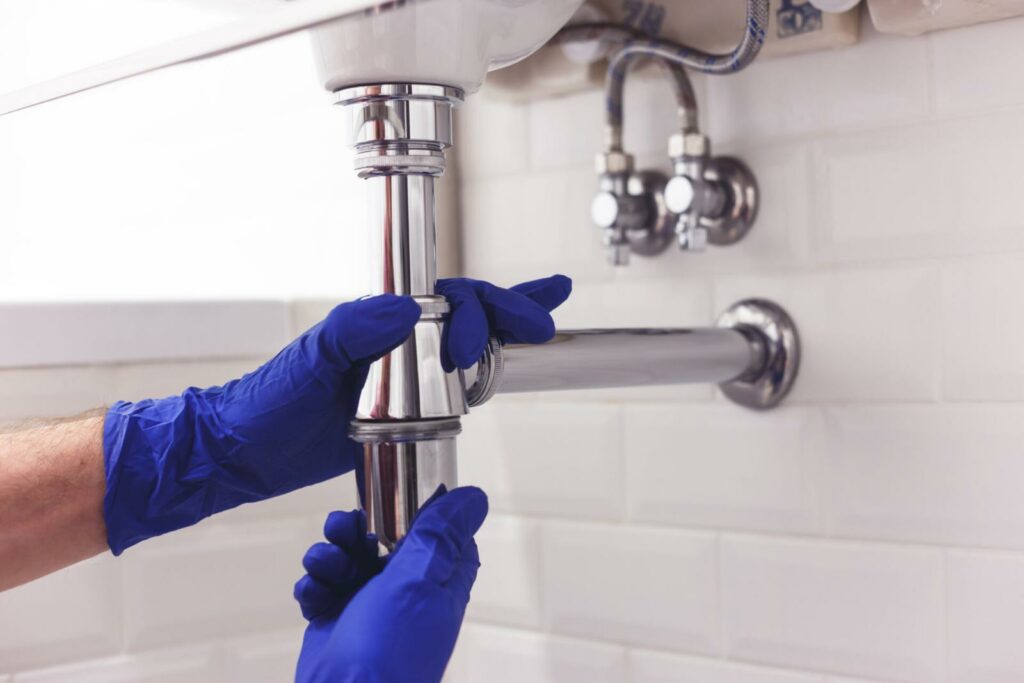You may not give much thought to the pipes that run behind your walls or under your floors, but they play a crucial role in the functionality of your home’s plumbing system. While they may seem insignificant, these pipes have the power to make or break your daily routines.
Imagine the inconvenience of a burst pipe flooding your home or the frustration of constantly dealing with leaks and clogs. In this ultimate guide, we will explore the world of long-lasting plumbing pipes, uncovering the secrets to ensuring a reliable and efficient plumbing system for years to come.
So, why settle for subpar pipes when you can have peace of mind and uninterrupted water flow?
Key Takeaways
- Copper and stainless steel pipes offer exceptional durability and resistance to corrosion, while PVC and PEX pipes are more affordable and easier to install.
- Consider the environmental impact of pipe materials, choose options with low environmental effects like copper and PEX, and avoid materials like PVC.
- Select pipes with higher energy efficiency to reduce carbon footprint and lower utility bills.
- Evaluate the specific needs of your plumbing system to determine the best pipe material for longevity and performance.
Types of Long-lasting Plumbing Pipes
When choosing the right plumbing pipes for your home, it’s important to consider the various types available to ensure long-lasting and reliable performance. One option to consider is using eco-friendly materials for your plumbing system. These pipes are designed to reduce environmental impact and promote sustainability. Some eco-friendly options include copper, PEX, and HDPE pipes.
Copper pipes have been used for plumbing systems for many years and are known for their durability and resistance to corrosion. They’re also recyclable, making them an environmentally friendly choice. However, copper pipes can be more expensive than other options and may require soldering during installation.
PEX pipes, short for cross-linked polyethylene pipes, are a popular choice among homeowners due to their flexibility and ease of installation. They’re also resistant to corrosion and provide excellent water flow. PEX pipes are less expensive than copper pipes and are available in various sizes to fit your plumbing needs. However, some concerns have been raised about the potential for leaching chemicals into the water supply.
HDPE pipes, short for high-density polyethylene pipes, are another eco-friendly option. They’re durable, resistant to corrosion, and have a long lifespan. HDPE pipes are also flexible, making them easier to install. However, they can be more expensive than other options and may require specialized tools for installation.
Benefits of Using Durable Pipe Materials
Using durable pipe materials for your plumbing system offers several benefits that contribute to its long-lasting and reliable performance.
One of the advantages of using durable pipes is their longevity. Unlike weaker materials, such as PVC or copper, durable pipe materials are designed to withstand the test of time. These pipes are built to resist corrosion, leaks, and other common issues that can plague plumbing systems. By investing in durable pipe materials, you can have peace of mind knowing that your plumbing system will remain intact and functional for years to come.
Another advantage of using durable pipe materials is their ability to handle high pressure. Whether you have a residential or commercial plumbing system, it’s crucial to choose pipes that can withstand the demands of high-pressure water flow. Durable pipe materials, such as stainless steel or PEX, are known for their strength and durability, making them ideal for handling high-pressure situations. This ensures that your plumbing system can efficiently deliver water to all areas of your home or building without any disruptions or failures.
In addition to longevity and high-pressure resistance, durable pipe materials also offer improved safety. Unlike weaker materials, durable pipes are less likely to burst or break under pressure. This means that you can avoid the potential damage caused by leaks, such as water damage to your property or the growth of mold and mildew. By using durable pipe materials, you can create a safer environment for yourself and your loved ones.
Factors to Consider When Choosing Reliable Pipes
To choose reliable pipes for your plumbing system, it is important to consider several factors. Durability comparisons and environmental considerations are two key aspects that you need to keep in mind when making your decision. Let’s take a closer look at each of these factors:
Durability comparisons: When it comes to the durability of plumbing pipes, you want to choose materials that can withstand the test of time. Some materials, like copper and stainless steel, are known for their exceptional durability and resistance to corrosion. On the other hand, materials like PVC and PEX may not be as durable, but they are more affordable and easier to install. It’s important to weigh the pros and cons of each material based on your specific needs and budget.
Environmental considerations: In today’s world, environmental consciousness is increasingly important. When selecting pipes for your plumbing system, it is crucial to consider the environmental impact of the materials you choose. Some materials, such as PVC, have been criticized for their potential negative impact on the environment during manufacturing and disposal. On the other hand, materials like copper and PEX are considered more environmentally friendly options. Additionally, choosing pipes with higher energy efficiency can help reduce your carbon footprint and lower your utility bills.
Consider the table below for a quick comparison of commonly used plumbing pipe materials:
| Material | Durability | Environmental Impact |
|---|---|---|
| Copper | High | Low |
| PVC | Medium | Medium |
| Stainless Steel | High | Medium |
| PEX | Medium | Low |
Maintenance Tips for Extending the Lifespan of Plumbing Pipes
Regular maintenance is essential for extending the lifespan of your plumbing pipes. By taking a few simple steps, you can ensure that your pipes remain in good condition for years to come. Here are three important maintenance tips to help you maximize pipe longevity:
- Keep your pipes clean: Over time, debris and sediment can build up inside your pipes, leading to clogs and reduced water flow. Regularly clean your pipes using natural solutions like baking soda and vinegar or enzymatic cleaners. Avoid using harsh chemicals that can corrode the pipes and cause damage.
- Inspect for leaks: Even small leaks can cause significant damage if left untreated. Regularly check your pipes for any signs of leaks, such as water stains, musty odors, or damp spots. If you notice any issues, promptly repair or replace the affected section of the pipe to prevent further damage.
- Protect against freezing: Freezing temperatures can cause pipes to burst, leading to costly repairs. Insulate exposed pipes in unheated areas, such as basements, crawl spaces, and attics. During extremely cold weather, allow a small trickle of water to flow through faucets to prevent freezing.
Common Issues With Plumbing Pipes and How to Prevent Them
One common issue with plumbing pipes is corrosion, but there are steps you can take to prevent it.
Corrosion occurs when the pipes are continuously exposed to water or moisture. One of the common causes of corrosion is the use of low-quality materials during the installation of plumbing pipes. These materials are more prone to corrosion and can lead to pipe deterioration over time.
Another cause of corrosion is the presence of acidic water in the plumbing system. Acidic water can corrode the pipes and cause them to deteriorate faster.
To prevent corrosion and pipe deterioration, it’s important to use high-quality materials during the installation process. Make sure to choose pipes that are resistant to corrosion and have a long lifespan. It’s also essential to regularly inspect your plumbing system for any signs of pipe deterioration. Look out for discolored or rusty water, leaks, or foul odors, as these can be indicators of pipe corrosion.
In addition to using high-quality materials and regular inspections, there are other preventive measures you can take. One effective method is to install a water softener or a water treatment system to reduce the acidity of the water. This will help minimize the risk of corrosion and extend the lifespan of your plumbing pipes.
Regular maintenance is also crucial in preventing pipe issues. Ensure that you clean your drains regularly to prevent clogs and blockages. Avoid pouring harsh chemicals down the drains as they can corrode the pipes. Instead, use natural alternatives or consult a professional plumber for cleaning solutions.
Upgrading to Long-Lasting Pipes: Is It Worth the Investment?
Are you considering upgrading to long-lasting plumbing pipes?
One important factor to consider is the cost versus the lifespan of the pipes. While long-lasting pipes may have a higher upfront cost, they can save you money in the long run by reducing the need for frequent repairs or replacements.
Additionally, upgrading to long-lasting pipes can have a positive impact on the value of your property, making it a worthwhile investment.
Cost Vs. Lifespan
When considering the upgrade to long-lasting plumbing pipes, it’s important to weigh the cost against the lifespan to determine if it’s a worthwhile investment. Here are three factors to consider when conducting a cost analysis:
- Initial Cost: Long-lasting pipe materials like copper or PEX may have a higher upfront cost compared to traditional materials such as galvanized steel or cast iron. However, their durability and longevity can potentially save you money in the long run.
- Maintenance Expenses: Long-lasting pipes typically require less maintenance and repairs, resulting in fewer expenses over time. This can help offset the initial investment and provide peace of mind, knowing that your plumbing system is less likely to fail.
- Increased Property Value: Upgrading to long-lasting pipes can enhance the value of your property. Potential homebuyers often prioritize plumbing systems with durable materials, making your investment a worthwhile one when it comes time to sell.
Impact on Property Value
Considering the potential increase in property value, upgrading to long-lasting pipes proves to be a valuable investment. In the competitive property market, homebuyers are increasingly looking for homes that have been well-maintained and equipped with durable infrastructure.
By opting for long-lasting pipes during your home renovation project, you can significantly enhance the appeal and value of your property. Long-lasting pipes are known to have a longer lifespan and require minimal maintenance, making them an attractive feature for potential buyers.
Moreover, these pipes provide peace of mind, as they’re less likely to cause plumbing issues in the future. Upgrading to long-lasting pipes not only ensures the longevity of your plumbing system but also adds value to your home, giving you a sense of belonging in a thriving property market.
Recap
Upgrading to long-lasting plumbing pipes is definitely worth the investment to ensure a durable and reliable plumbing system.
By using durable pipe materials, considering factors such as corrosion resistance and proper maintenance, you can extend the lifespan of your pipes and prevent common issues.
With the ultimate guide to long-lasting plumbing pipes, you’ll have the knowledge and tips needed to make the best choices for your plumbing needs.
Don’t hesitate to invest in the longevity and efficiency of your plumbing system.

